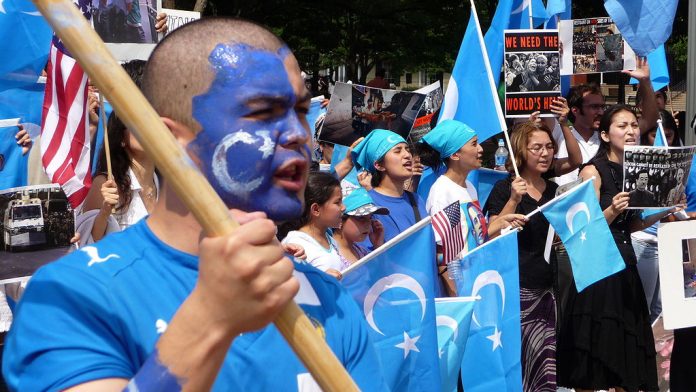I am among thousands of Uyghurs who cannot renew their passports and like them I cannot make plans. I cannot enroll at university, I cannot work, and I cannot travel. I don’t want to go back to China to get a new passport out of fear I will never come back. I don’t know what to do.
This is what Ablet, a Uyghur male in his twenties, told me late last year. I was researching looming statelessness among Uyghurs overseas for a new Uyghur Human Rights Project report, and Ablet was one of several interviewees in Turkey living without papers. The problem is not contained to Turkey. The Chinese government has presented a stark choice to Uyghurs across the globe with an expiring or expired Chinese passport: return to China and face probable detention or break the law in the country of your residence.
In speaking with Uyghurs, a pattern of denial for passport renewals at Chinese consulates became clear. The only option for renewal is to use a one-way travel document to China and “apply” there. Given the Chinese state has interned and imprisoned Uyghurs with any overseas connection, the best that can be said for this option is it is disingenuous. As the recently leaked Qaraqash Document revealed, even applying for a passport could land a Uyghur in a camp.
However, the implications of not having proper documentation in Turkey and elsewhere are significant: Uyghurs said they are unable to get married, get a job, rent or buy a house, and send their children to school. This default statelessness places Uyghurs into “forced illegibility” in the countries where they reside so they cannot access services and start new lives. Furthermore, until overseas Uyghurs make the high-risk decision to return to China, the Chinese state will not attempt to recognize their rights as Chinese citizens.
Weaponized passports have long been the reality for Uyghurs and a recurring Chinese government tactic to impose control over Uyghur bodies. The Uyghur Human Rights Project has documented a pattern of passport denials, confiscations, and discriminatory application procedures since 2006. When passports were available to Uyghurs, it took connections and bribery to secure one.
A new turn in this control occurred when the Chinese authorities started to recall the passports of Uyghurs already overseas. In early 2017, Uyghur students abroad were ordered to return to their hometowns by May. A police officer in Barin township explained the rationale: “From what I understand, the goal of this policy is to identify their political and ideological stance, and then educate them about our country’s laws and current developments.” Radio Free Asia described how the students’ relatives in China were the “security” to ensure their return. The order was issued to Uyghur individuals in Turkey, France, Australia, and the United States. Believing they had done nothing wrong, some students returned and subsequently disappeared. Others took their chances outside of China.
Research on the technology-led surveillance state in the Uyghur region since 2017 has uncovered the Chinese government’s preoccupation with data collection on individuals. While denial of passport renewals made Uyghurs invisible overseas, millions of Uyghurs underwent a process of “forced legibility” to the Chinese state. Their homeland became a laboratory of novel surveillance and categorization technologies that included collection of DNA samples, fingerprints, voice and face signatures, as well as iris scans. Behaviors, at home and online, were recorded and linked to these biometric identifiers through the Integrated Joint Operations Platform, a database amassing tremendous amounts of data scraped from different sources. In “public” spaces, facial recognition cameras, checkpoints and in-community monitoring tracked Uyghurs’ movement. James C. Scott defined legibility as the state’s attempt “to arrange the population in ways that simplified the classic state functions of taxation, conscription, and prevention of rebellion.” However, the process in the Uyghur region is on an unprecedented scale and drives the widely reported mass internments and imprisonments.
Chinese state propaganda has developed a narrative that the internment camps are “vocational education and training centers,” where recalcitrant Uyghurs would be finally able to develop the skills to lead productive lives. As a recent Global Times article put it: “previous unemployment problems in some places were partly caused by local residents’ lack of vocational skills and low economic development level.” However, a body of credible evidence detailing forced labor among “graduates” of these facilities belies such discourses, as well as the government’s advertising of a cut-rate labor pool to industry.
In sum, forced legibility is not only about quelling ethno-religious sentiments among Uyghurs, but also the collectivization of Uyghurs toward economic exploitation. Any Uyghur who has not been surveilled, categorized and sent to work has no use, a non-person, illegible. Consequently, Uyghurs overseas who want a new passport must return to China for identification and assignment. Remaining abroad pushes them to the margins of their host societies. As one Uyghur told me: “I don’t know what is going to happen in the next two minutes, let alone be able to build a future.” The marginalization of undocumented Uyghurs has other impacts, such as collective stigmatization in the pursuit of economic survival.
In the context of a pandemic where fundamental questions about public health and financial stability are staring many of us in the face, why should we care? The answer is that this is precisely the time to care. As we are beginning to learn, denial of rights and access to services impacts all of us. We must ensure vulnerability due to discriminatory state policies is brought out into the open and properly addressed. As Kapoor and Narkowicz note citizenship and its markers, such as passports, have become instruments of exclusion and are “being formally institutionalized as a privilege, not a right…of late it appears that in the name of national and global security greater conditions are to be placed on this nominal right, such that citizenship itself becomes a disciplinary device.”
In the pandemic and post-pandemic era, marginalized populations have felt and will feel the brunt of the economic downturn. Living without proper documentation in societies under severe financial strain will make dignified lives near impossible. To protect ourselves, we ought to be protecting those around us. Uyghurs, or any other marginalized people, should be able to find work, go to school and visit a doctor. States which host Uyghur populations must ensure that they are granted legal status and documentation, and access to public services. While “no human is illegal,” governments can certainly make them illegible.
The views and opinions expressed in this article are those of the author.

Henryk Szadziewski is Director of Research at the Uyghur Human Rights Project and a PhD Candidate at The University of Hawaiʻi.


